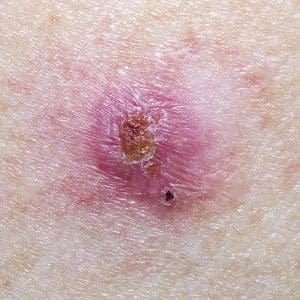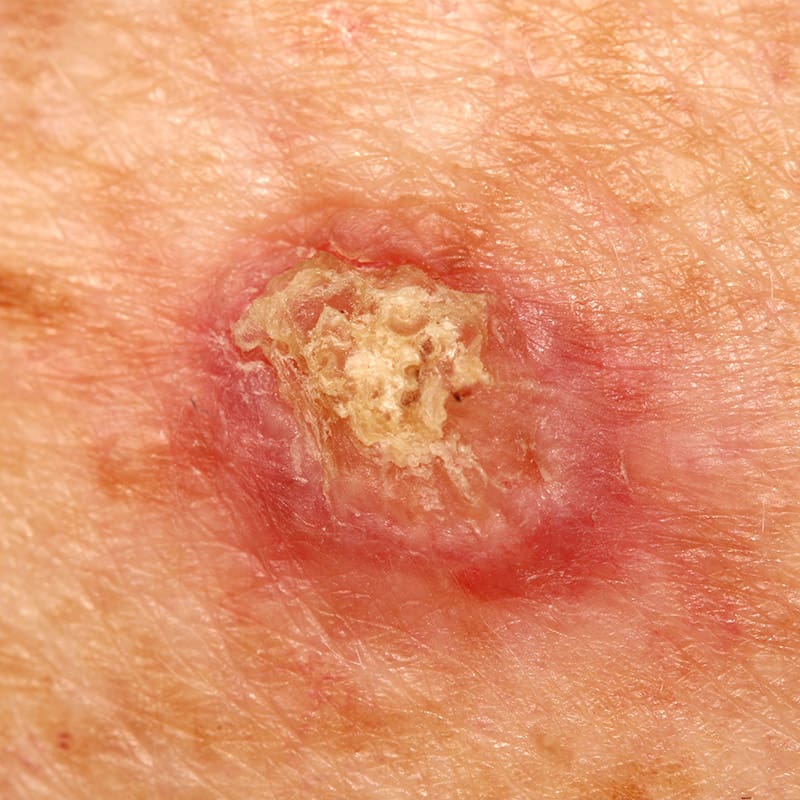WE CAN DIAGNOSE & TREAT SKIN CANCER EARLY
At our Perth skin cancer clinic, we aim to protect lives through early detection of skin cancer. Our skilled doctors offer comprehensive services including skin and mole checks, diagnosis, and treatment.
We provide thorough examinations, giving you the chance to discuss concerns, ask questions, and learn how to reduce your risk of skin cancer.
Conveniently located in the heart of Perth, we offer easily accessible skin cancer checks for you and your loved ones. Don’t delay – book a comprehensive skin check or screening with us today.
WHAT IS SKIN CANCER?
Skin cancer refers to the abnormal, uncontrolled growth of skin cells. It is the most common form of cancer worldwide, representing around 80% of all diagnosed cancers. Australia has one of the highest rates in the world due to our outdoor lifestyle, with two thirds of all Australians being diagnosed with skin cancer by the age of 70.
Skin cancer is caused by damage to the skin’s DNA from ultraviolet (UV) radiation. Skin cancer can develop on any part of the body, but is most commonly found on areas that are regularly exposed to the sun, such as the face, neck, arms, and legs.
Types of skin cancer
There are three main types of skin cancer: basal cell carcinoma (BCC), squamous cell carcinoma (SCC), and melanoma. BCC and SCC are non-melanoma skin cancers, which are less dangerous than melanoma, but still require prompt treatment. Melanoma is the most dangerous type of skin cancer, as it can spread quickly to other parts of the body and become life-threatening.

Melanoma

Basal Cell Carcinoma

Squamous Cell Carcinoma
Treating skin cancer
The most effective treatment for skin cancer is early detection and prompt treatment. Regular skin checks are recommended, especially for those with a history of sun exposure or family history of skin cancer. Suspicious skin lesions should be biopsied and examined under a microscope to determine the type and stage of the cancer.
Fortunately, skin cancer is always almost curable if detected and treated early enough. Our team of skin cancer experts can assist you in the process of being tested and treated for skin cancer.
What does skin cancer look like?
Skin cancer can vary in shape, colour, size and texture, making it hard to recognise. It may appear as a new mole or lesion, or raised lump or ulcer, or as flat scaly lesion. Early skin cancer detection starts with being familiar with the moles and lesions on your own body. If you notice any skin lesion that is new, changing or suspicious, schedule a skin check with your doctor immediately.
Why you should get a skin check
Skin cancers grow slowly over time, making regular skin checks essential for early detection and treatment of skin cancer. Catching it early can stop it from spreading and becoming life-threatening.
During a skin check, a healthcare professional examines your skin to find any suspicious moles or lesions that may be cancerous. Skin screening provides a more comprehensive assessment, possibly including imaging and biopsy, to catch skin cancer early.
We recommend having a skin check at least once a year, or more often if you have a history of sun exposure or family history of skin cancer. Practicing sun protection and avoiding tanning beds are also essential for lowering your risk of skin cancer.
Frequently Asked Questions
WHAT CAN YOU EXPECT DURING A SKIN CANCER CHECK?
Your appointment will begin with a consultation where your doctor will discuss skin cancer risks and other relevant issues in your medical history. During this discussion, we will determine the areas you are concerned with, your risks and what types of tests and treatments that are available if you are found to have skin cancer.
During your skin cancer screening appointment, our healthcare professionals will conduct a thorough examination of your skin. This will include checking any moles or lesions that you may have on your body. We use a specialised tool called a dermatoscope to examine the skin in detail and look for any abnormalities that may be indicative of skin cancer.
If we detect any suspicious moles or lesions, we may recommend a biopsy to determine if the cells are cancerous. A biopsy involves removing a small sample of skin tissue for laboratory analysis.
Typical treatments that can occur on the day include:
- Cryotherapy (freezing)
- Diathermy (burning)
- Simple biopsies
Depending on the outcome of your test, you might be required to do a follow-up session.
WHAT ARE THE RISK FACTORS OF SKIN CANCER?
There are several risk factors that can increase a person’s likelihood of developing skin cancer. Regardless of risk factors, it is advisable for everyone to examine their own skin regularly and scheduled in regular skin checks by your doctor. The following are some of the risk factors for skin cancers:
- Anyone over the age of 40 years old.
- Anyone with multiple moles or dysplastic naevi on their body
- Anyone with pass history of skin cancer or precancerous skin lesions.
- People with fair or pale skin, light-coloured hair, and light-coloured eyes are also at higher risk of developing skin cancer due to their increased sensitivity to UV radiation.
- Exposure to ultraviolet (UV) radiation from the sun or tanning beds is the primary risk factor for skin cancer. The more sun exposure a person has over their lifetime, the greater their risk of developing skin cancer.
- Patient with history of blistering sunburns, repeated sun burn or regular sun exposure.
- Those with a family history of skin cancer, especially family history of melanoma.
- Anyone with weakened immune system or undergoing immunosuppression treatment due to underlying medical illness
- Some medical conditions and medications can also increase the risk of skin cancer.
- Anyone with exposure to radiation and substances such as arsenic
It is important to be aware of these risk factors and take steps to protect your skin from UV radiation, such as wearing protective clothing, seeking shade, and using sunscreen with a high SPF.




